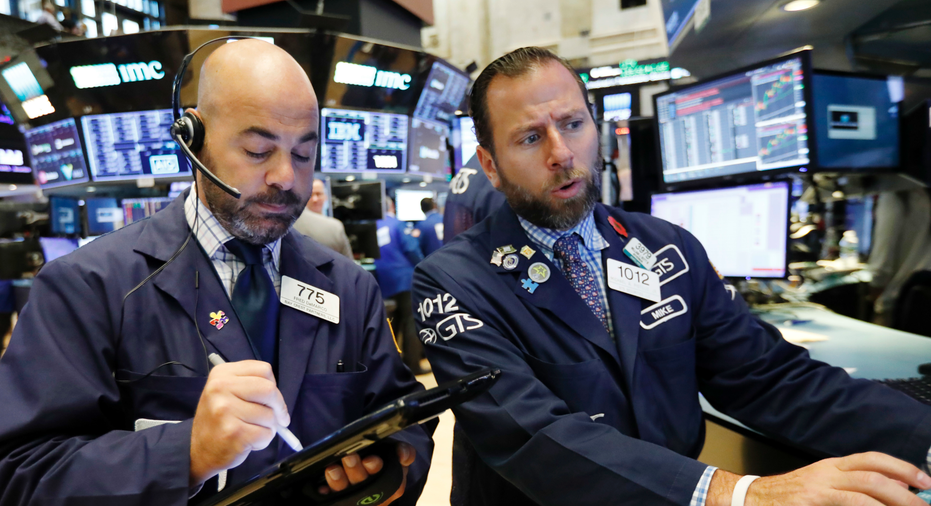US stock indexes turn lower on renewed trade concerns
Specialist Meric Greenbaum, left, and trader Gregory Rowe work on the floor of the New York Stock Exchange, Friday, Sept. 14, 2018. Global stock markets rose further on Friday on hopes that the United States and China will call time-out in their escalating trade feud. (AP Photo/Richard Drew)
NEW YORK – U.S. stocks are slightly lower Friday after giving up an early gain. Retailers are slipping and high-dividend stocks are falling as interest rates rise. Smaller companies are climbing.
Stocks turned lower after Bloomberg News reported that President Donald Trump still wants to put tariffs on an additional $200 billion in imports from China. China had said the U.S. reached out to open a new round of trade talks.
Banks rose along with interest rates after the Federal Reserve said production of cars and energy jumped in August. Investors expect continued economic growth and further interest rate increases.
KEEPING SCORE: The S&P 500 index slipped 1 point to 2,902 as of 2:30 p.m. Eastern time. The Dow Jones Industrial Average fell 24 points, or 0.1 percent, to 26,121. The Nasdaq composite slid 4 points, or 0.1 percent, to 8,008.
The combination of trade worries and positive economic news is helping smaller companies, which do more business in the U.S. than larger companies do. The Russell 2000 index of smaller-company stocks gained 8 points, or 0.5 percent, to 1,722.
FACTORY FACTOR: U.S. industrial production rose by a healthy 0.4 percent in August, according to the Federal Reserve. The central bank said production of autos climbed, while production of oil and natural gas continued to rise. Aerospace company Boeing jumped 1 percent to $359.08 and shipbuilder Huntington Ingalls gained 1.4 percent to $252.44.
The Fed's report is a sign the U.S. economy is likely to keep growing, which means the Federal Reserve is likely to continue raising interest rates. The yield on the 10-year Treasury note rose to 2.99 percent from 2.96 percent late Thursday.
Banks and financial companies rose, as higher long-term interest rates help them make more money from mortgages and other types of loans. Prudential Financial added 2.9 percent to $99.93 and LendingTree gained 2.4 percent to $236.83.
TRADE UPDATE: Bloomberg News reported that Trump still wants to tax an additional $200 billion in Chinese imports at a 25 percent rate, but hasn't gone ahead with the proposed tariffs yet because it is still considering some possible changes.
China's government said Thursday that the U.S. government has invited it for talks on their escalating trade dispute. The new round of tariffs would represent a major escalation in the U.S.-China conflict, which has lasted for most of this year.
RETAIL SALES: Consumers slowed their spending in August and the Commerce Department said retail sales grew 0.1 percent for the month after a 0.7 percent jump in July.
The prices for clothing and other items dipped, which might have encouraged shoppers but reduced revenue for companies. Gap fell 1.8 percent to $27.73 and TJX, the owner of T.J. Maxx and Marshalls, fell 0.5 percent to $108.41.
Consumer confidence is at its highest level in 18 years, and the slowdown in August could prove to be temporary.
GAS EXPLOSIONS: A series of gas explosions killed one person at injured at least 10 and forced evacuations in three communities north of Boston. They are served by Columbia Gas, a unit of NiSource. The company put out a statement late Thursday saying its crews were performing safety checks.
The company's stock lost 10.7 percent to $25.07.
STORM WATCH: Hurricane Florence came ashore in North Carolina Friday morning, and while its winds have weakened days, experts say the storm surge is a significant threat. The storm is slow moving, meaning North and South Carolina could get days of heavy rain.
While Florence could do significant damage to the region, it's not expected to have a big effect on the overall economy. Economists at HIS Markit said the hurricane might slow down growth in the third quarter a bit but would likely contribute to growth in the fourth quarter.
Analyst Ryan Detrick at LPL Financial said hurricanes generally have little immediate effect on stock prices.
UP IN SMOKE: Shares in British Columbia marijuana company Tilray, which have made huge gains in the last two months, slumped after Politico reported that the U.S. Customs and Border Patrol may ban people who work in the marijuana industry from entering the country.
Canada is set to legalize marijuana in October and stocks in the industry have soared recently. Tilray slumped 12.2 percent to $105.10. The stock was valued at $17 when Tilray went public in July.
ENERGY: Benchmark U.S. crude added 0.6 percent to $68.99 a barrel in New York. Brent crude, used to price international oils, dipped 0.1 percent to $78.16 a barrel in London.
Wholesale gasoline lost 1.1 percent to $1.97 a gallon and heating oil fell 0.6 percent to $2.21 a gallon. Natural gas dropped 1.8 percent to $2.77 per 1,000 cubic feet.
METALS: Gold lost 0.6 percent to $1,201.10 an ounce. Silver fell 0.7 percent to $14.14 an ounce. Copper sank 1.4 percent to $2.65 a pound.
CURRENCIES: The dollar rose to 112.01 yen from 111.88 yen. The euro slipped to $1.1631 from $1.1692.
OVERSEAS: The German DAX added 0.6 percent and the French CAC rose 0.5 percent. Britain's FTSE 100 index picked up 0.3 percent.
Japan's benchmark Nikkei 225 gained 1.2 percent and South Korea's Kospi advanced 1.4 percent. Hong Kong's Hang Seng rose 1 percent.
____
AP Markets Writer Marley Jay can be reached at http://twitter.com/MarleyJayAP His work can be found at https://apnews.com/search/marley%20jay





















